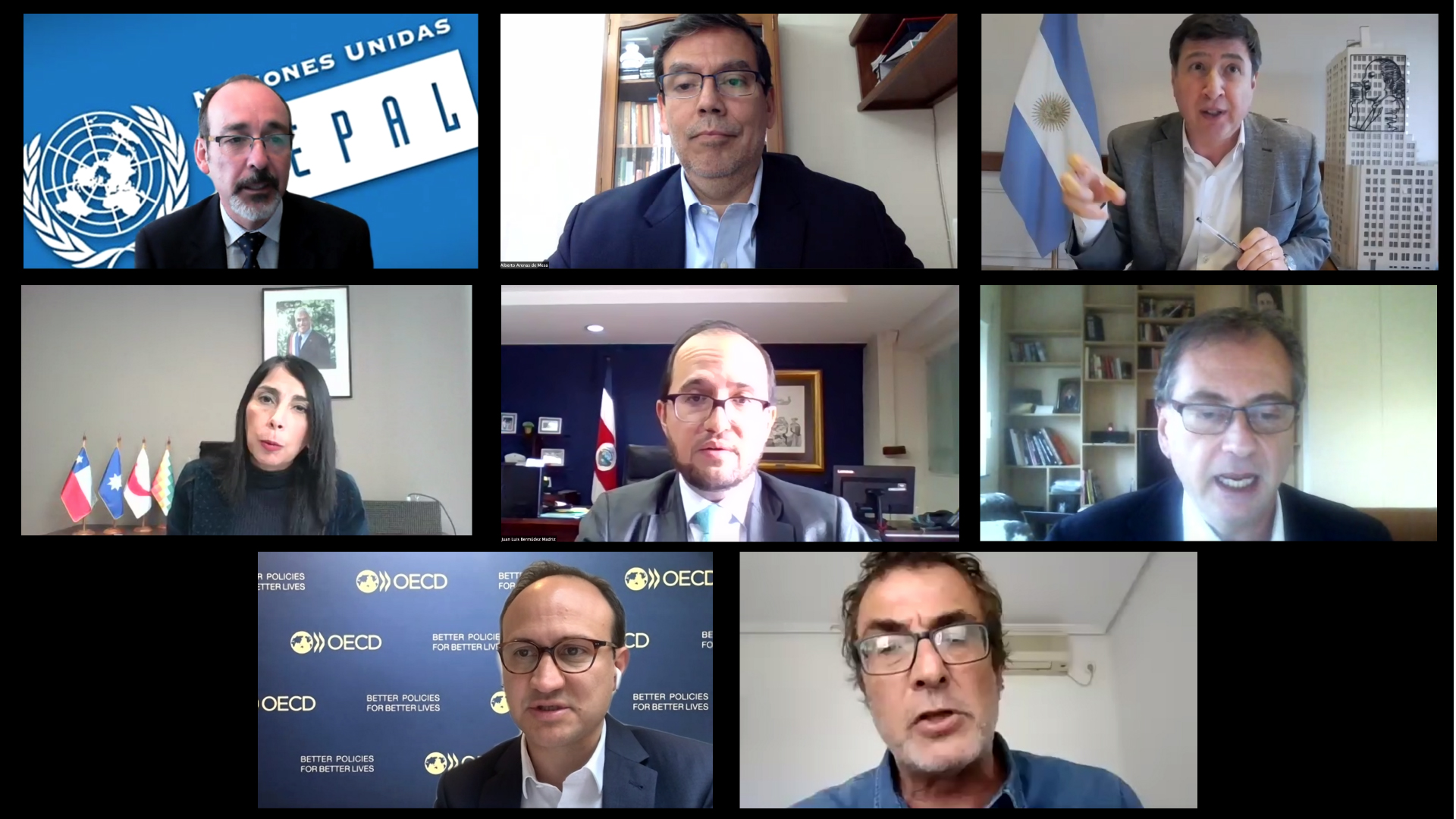The Pandemic Showed the Need to Move Towards Universal, Comprehensive, Sustainable and Resilient Social Protection Systems
Work area(s)
Social Development authorities, international officials and specialists participated in an event on middle-income strata, COVID-19 and the challenges of social protection, organized by ECLAC in the framework of Development in Transition month.

The emergency measures taken by the countries of Latin America and the Caribbean have attenuated the social impacts of the COVID-19 crisis, but the pandemic’s duration over time and the region’s structural gaps show the urgency of moving towards universal, comprehensive, sustainable and resilient social protection systems, according to the Social Development authorities, international officials and specialists who participated in an event organized by ECLAC in the framework of the month-long series, “Development in Transition: Dialogues to chart new paths for Latin America and the Caribbean.”
The event, entitled Middle-income strata, COVID-19 and the challenges of social protection, in the context of Development in Transition Days (DiT), featured opening remarks by Felice Zaccheo, Head of Unit for Mexico, Central America, Caribbean and Regional Operations 2 of the European Commission’s Directorate-General for International Partnerships; and Alberto Arenas de Mesa, Director of the Social Development Division of the Economic Commission for Latin America and the Caribbean (ECLAC), who also made a presentation on the regional situation.
Subsequently, the speakers included Daniel Arroyo, Minister of Social Development of Argentina; Juan Luis Bermúdez, Minister of Human Development and Social Inclusion of Costa Rica; Karla Rubilar, Minister of Social Development and Family of Chile; Sebastián Nieto Parra, Head of Latin America and the Caribbean Unit at the Development Centre of the Organisation for Economic Co-operation and Development (OECD); and Rubén Lo Vuolo, Academic Director and Senior Researcher at CIEPP. The closing remarks were made by Rodrigo Martínez, Senior Social Affairs Officer at ECLAC’s Social Development Division.
Felice Zaccheo detailed the cooperation and partnership initiatives on social protection currently being carried out by the European Union in Latin America, which ultimately strive for the systems implemented by the region to be less sensitive to the impact of crises and to be aligned with the 2030 Agenda’s Sustainable Development Goals (SDGs), he explained.
During his presentation, Alberto Arenas de Mesa, Director of ECLAC’s Social Development Division, indicated that the pandemic has deepened the structural problems of inequality, labor informality and poverty in the region, with a high impact on women, informal workers and young people.
Despite the numerous social protection measures implemented by countries during the emergency (263 in 2020), which attenuated the rise in poverty, the population’s vulnerability has increased, he warned. It is estimated that in 2020, 491 million Latin Americans were living with low and lower-middle income (up to three times the poverty line), he specified.
Emergency cash transfer amounts have not been enough to meet the population’s basic needs in all countries. Only 6 out of 16 countries in Latin America provided, during the March-December 2020 period, cash transfers of an average monthly amount that either neared or surpassed the extreme poverty line, he explained.
With a view to the economic recovery, Arenas warned that, as of July 4, just 13.6% of Latin America and the Caribbean’s population had completed its vaccination process, which means that international and regional solidarity is urgently needed for universal and equitable access to vaccines.
For a transformative recovery with equality and sustainability, ECLAC proposes moving towards a welfare state with universal, comprehensive and sustainable social protection systems in the region; maintaining emergency social protection transfers in 2021; increasing the sufficiency of benefits and fostering a Universal Basic Income, to reach all people; promoting labor inclusion with decent work; ensuring universal access to quality health and education; and moving towards a care society, he stated. All of this entails discussing new social and fiscal compacts in the region’s countries, he added.
Meanwhile, in his remarks, Argentine Minister Daniel Arroyo addressed the pandemic’s social impact in his country and the package of measures implemented by the government thus far, recognizing the multiple and differentiated needs observed in distinct sectors of the population. The debate about a universal basic income must take root in Latin America, he sustained.
Minister Karla Rubilar, of Chile, stated that one of the current challenges faced by her country is “how to maintain direct transfers that allow for overcoming poverty, and establish a minimum standard for social rights, and make them compatible with initiatives to create formal employment” with rights and social protection.
With regard to strengthening social protection systems, Minister Juan Luis Bermúdez of Costa Rica stressed the importance of “ensuring financial sources that are sufficient, sustainable and resilient to future crises, because this will not be the last one the region has to face.”
Meanwhile, Sebastián Nieto Parra of the OECD Development Centre compared the dissimilar scenarios faced by the countries of Latin America and the Caribbean, and Europe, before the pandemic – which have largely determined the social effects of the crisis in both regions. While the Latin American and Caribbean region is characterized by its high levels of social vulnerability and labor informality, Europe has very low levels of informality and strong social protection systems that reacted quickly to the emergency, he stated.
Finally, Rubén Lo Vuolo of CIEPP reinforced that the pandemic has demonstrated the need to further initiatives such as the universal basic income or citizen’s income, but as a complement to the provision of quality public goods, such as health and education, he clarified.
The event on middle-income strata was one of four events that ECLAC is organizing in the framework of the dialogues on development in transition, which were convened by the United Nations regional organization, the European Commission and the OECD Development Centre.
Type
Country(ies)
- Europe
- European Union
- Latin America and the Caribbean
Contact
Public Information Unit
- prensa@cepal.org
- (56 2) 2210 2040

